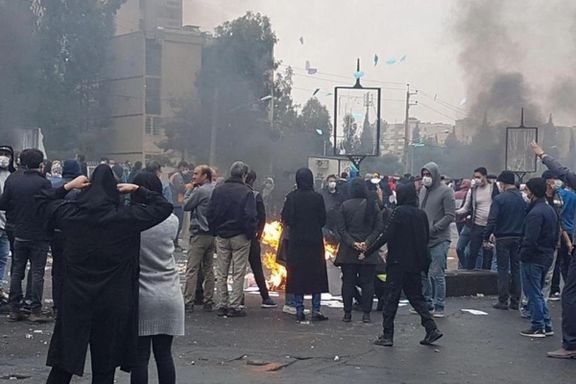Iran Security Forces Pressure Families Of Those Killed In Protests

Rights activists say Iran's security forces are pressuring victims' families of November 2019 protests to make them forego commemorations for their loved ones.

Rights activists say Iran's security forces are pressuring victims' families of November 2019 protests to make them forego commemorations for their loved ones.
Speaking to Iran International TV, rights activist Pouran Nazemi said intelligence ministry agents have threatened families that "they will be held responsible" if anything happens in anniversary ceremonies that they hold. According to Nazemi, security forces have also threatened activists, who have previously been sentenced for their political activities, that their suspended sentences will be enforced if they participate in any gatherings or ceremonies to honor the victims of the protests.
While the government has never issued an official tally of those killed and detained, non-government estimates range from 300 to 3,000 killed by security forces. The protests erupted in mid-November 2019, spreading overnight to almost every major city, when the government announced an increase in the price of gasoline amid a serious fiscal crisis and rising prices for food and other necessities.
A report by Human Rights in Iran in February claimed that at least 3,000 protesters were killed by the Islamic Republic security forces from November 15 to 17, and nearly 20,000 were arrested during and after the events often referred to as "bloody November" of 2019.
Rights activists have in recent days reported an increase in arrests of activists and government violence victims' family members in several provinces including Tehran.
Last week Gohar Eshghi, the elderly mother of the 35-year-old blogger Sattar Beheshti who was killed under torture in prison in November 2012, and two other members of the family were arrested to prevent them from holding a remembrance ceremony. Ms. Eshghi who was freed Saturday and mothers of other victims of government violence including those killed in November 2019 often hold gatherings and campaign on social media in remembrance of their children and other victims.
According to a Reuters special report published in December 2019, Iran's Supreme Leader Ali Khamenei, in a meeting with government officials on November 17, 2019, two days after protests started, ordered an end to the unrest, saying the Islamic Republic was in danger. "Do whatever is necessary to end these protests. This is my order,” Khamenei allegedly said while telling officials that he would hold them responsible if the protests did not stop immediately.
The November 2019 protests have been the most widespread against the Islamic Republic since its establishment in 1979. Authorities shut down the internet for over a week to help news of the unrest and killings from spreading to media outside Iran.
In a statement ahead of the 15 November anniversary of the protests, political activist Abolfazl Ghadiani (Qadiani), a former supporter of the Islamic Republic, said the bloody response to the November 2019 protests added a new page to the “dark and long record of killings” by Iran’s rulers. The former revolutionary who now calls Khamenei "a despot" added that most Iranians want "an end to the Supreme Leader’s monarchy”.
Tweet unavailable